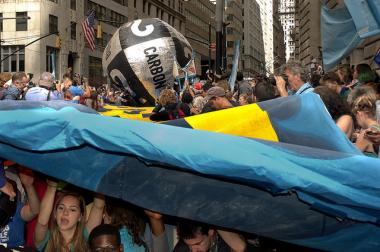
On Monday, a day after nearly 400,000 marchers gathered for the largest climate march in history, activists and protesters turned their attention to the many links between capitalism and climate change by flooding Wall Street with supporters.
By early afternoon Monday, several thousand people were gathered just down the street from Wall Street around the iconic Charging Bull statue. They waved flags, chanted, and sat down on the street to draw attention to what they consider to be the primary cause of climate change.
The scene was far more tense than that of the previous day; two people were reportedly arrested for trying to cross a police barricade and several journalists and activists reported on Twitter that the NYPD used pepper spray on protesters rushing a barricade.
“We talk a lot about climate change and the root problems of climate change, but not many people are willing to say that the root problem of climate change is capitalism,” Sam Neubauer, 19, who came to the protest from Minnesota, told ThinkProgress. “Large corporations profit from capitalism by extracting oil and burning that oil and we need to call that out explicitly.”
Neubauer, who organized a bus to come to the climate march from Minnesota, said that Sunday’s march was “family friendly” and more about showing the size of the movement. Flood Wall Street is about more radical direct action.
“I think there are always a whole variety of different ways to be involved,” he said.
Nate Bresner, 17, from Boston, said that knowing that if capitalism continues unchecked it “will make us unable to live on our planet” is terrifying, but also provides a “hard and fast deadline” to come up with alternatives.
“The way I see it, yesterday was about a whole spectrum of alternatives from people who support renewable energy tax credits to people that support Marxist revolution and today is about being more pointed about who is at fault,” Bresner said.
Bresner, who also helped organize the event, said it started out at Battery Park where speakers from front-line communities — those experiencing the impacts of climate change now — spoke and gave the “moral imperative” for action. Then several thousand people lined up to head to the New York Stock Exchange but stopped a block or two short to congregate around the Charging Bull.
While the Flood Wall Street gatherers focused on the ways that big companies profit from fossil fuel extraction and environmental degradation, much of this week of climate change action in the build-up to the United Nations summit on Tuesday has been about how addressing climate change and growing the economy can work together in positive ways.
That relationship was the focus of the New Climate Economy report released last week, which concluded that if the $90 trillion expected to be invested in global infrastructure in the next 15 years is done in a low-carbon manner, it could “cost about the same as conventional infrastructure, but would deliver significantly greater economic, social, and environmental benefits in the long-run.”
On the other side of the Charging Bull curious passersby paused to take in the cacophonous scene. William Crow, a financial sector worker in town from Virginia for the day, said he didn’t know what was happening but that he was familiar with the climate march from the day before.
“I don’t think our country is serious enough about climate change,” he said. “I see this as being proactive.”
While Crow said he firmly believes in the free market system, he thinks there needs to be greater awareness of the societal effect of business.
“There’s just this one planet we live on, and something is not right,” he said. “There’s dramatic changes in climate happening all over the world that we are all aware of — and yes they happen all the time but they seem to be happening in greater numbers nowadays. There seems to be hard indicators now that this relates to extreme climate conditions.”
Crow said that this all comes back to capital markets and that social implications need to be given more weight. “That has to be part of the equation,” he said. “When they run their metrics on business models, climate shouldn’t be the last thing considered — it should be one of the top factors to be debated.”
Derek Persaud, an engineer who works for a company that represents the Federal Transit Administration, said he thinks the protest is a good start.
“The U.N. Summit tomorrow is a big thing,” Persaud told ThinkProgress from the sidelines of the action. “There’s so much we can do but we also need to bring other people on board. It’s a global thing.”
Update: On Monday night just over 100 protestors near Wall Street were arrested or summoned, mostly for disorderly conduct, including a man dressed in a polar bear costume. The activists did not have a permit for the demonstration from the NYPD, meaning they risked arrest for participating.
This piece was originally published on Think Progress.
Share +
- Share ‘Flood Wall Street’ Protesters Say Root Cause Of Climate Change Is Unchecked Capitalism on Facebook
- Tweet ‘Flood Wall Street’ Protesters Say Root Cause Of Climate Change Is Unchecked Capitalism!
- Share ‘Flood Wall Street’ Protesters Say Root Cause Of Climate Change Is Unchecked Capitalism on Google +
- Reddit ‘Flood Wall Street’ Protesters Say Root Cause Of Climate Change Is Unchecked Capitalism!

